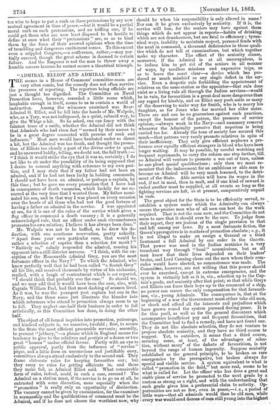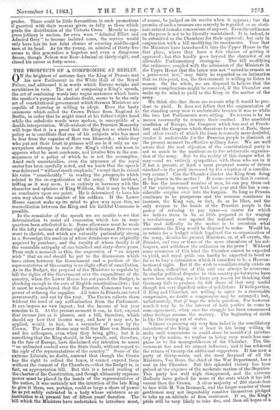"ADMIRAL ELLIOT AND ADMIRAL GREY." T HE scenes in a House
of Commons' committee-room are very often comic, but the comedy does not often survive the processes of reporting. The reporters being officials are just a thought too dignified. The Committee on Naval Promotion have, however, recorded a little scene which, laughable enough in itself: seems to us to contain a world of instruction. Among the witnesses examined was Rear- Admiral G. Elliot, and he fell into the hands of Mr. Walpole, who, as a Tory, was not indisposed, in a quiet, subacid way, to give the Whigs a hit. So he asked, one can fancy with the faintest trace of a smile, whether the Admiral did not think that Admirals who had risen fast " seemed by their names to be in a great degree connected with persons of rank and influence." Most men would have hesitated under so direct a hit, but the Admiral was too frank, and thought the promo- tion of Elliots too clearly a part of the divine order to quail, and he answered boldly, telling, we doubt not, the full truth : " I think it would strike the eye that it was so, certainly; I do not like to sit under the possibility of its being supposed that I desire to conceal anything with reference to my own posi- tion, and I may state that if my father had not been an admiral, and if he had not been lucky in holding commands, I should not have been an admiral, or perhaps a captain, by this time ; but he gave me every promotion that I have had in consequence of death vacancies, which luckily for me oc- curred at the very time that I wanted them. My father nomi- nated his son, and in that way I was placed on every occasion over the heads of all those who had not the good fortune of having a father an admiral in the service. I was appointed at sea, for it is one of the rules of the service which gives a flag officer in command a death vacancy ; it is a generally acknowledged rule, that an officer under such circumstances promotes his own relation; I believe it has always been done." Mr. Walpole was not to be baffled, so he drew his de- duction, with one courteous reservation, pretty nakedly. " Apart from your own particular case, that would be rather a selection of caprice than a selection for merit ? " "Entirely so," colmly responded the admiral, rousing his opponent into a still directer sarcasm. " I think, with the ex- ception of the Honourable Admiral Grey, you are the most fortunate officer in the Navy ?" To which the Admiral, who knew perfectly well that he had been called "a Scotch Grey" all his life, and received thousands by virtue of his nickname, replied, with a laugh of contentment which is not reported, "I should think that probably was the case." So should we, and we may add that it would have been the case, also, with Captain William Peel, had that most dashing of seamen lived. As it was, he was the youngest post captain but one in the Navy, and the three cases just illustrate the blunder into which reformers who attend to promotion always seem to us to fall. They neglect one-half their business in order to fail artistically, as this Committee has done, in doing the other half.
The object of all formal inquiries into promotion, patronage, and kindred subjects is, we conceive, twofold ; first, to secure to the State the most efficient procurable servants ; secondly, to prevent "jobbery,"—a phrase which in England means the tendency to give to the relatives and protige8 of a dozen or two great " houses " undue official favour. Partly with an eye to public approval, partly from the influence of " service " pique, and a little from an unconscious and justifiable envy, committees always attend exclusively to the second end. They frame elaborate rules for keeping favourites out ; but they essay no rules for getting efficients in. and those they make fail, as Admiral Elliot said. -What conceivable form of rules, indeed, could, in such a case, succeed ? The Admiral on a station must, if the service is to go on at all, be entrusted with some discretion, more especially when the "promotion " is really only an opportunity of distinction. The vacancy cannot be given by examination, for the examiner in seamanship and the qualifications of command must be the Admiral, and if he does not choose the worthiest now, why should he when his responsibility is only altered in name ? Nor can it be given exclusively by seniority. If it is, the service will lose, for the seniors may have against them things which do not appear in reports—habits of drinking which are not drunkenness, but are fatal to efficiency ; tyran- nical ways, inability to maintain respect, personal feuds with the next in command, a thousand deficiencies in those quali- ties which do not tell at examinations, but which together make up character. The effect of the seniority clause, moreover, if the Admiral is at all unscrupulous, is to induce him to get rid of the seniors in all manner of ways, by needless missions and expensive trips, so as to leave the coast clear—a device which has pro- duced as much mischief as any single defect in the ser- vice. Even a despotic rule forbidding the appointment of relatives on the same station as the appointer--that rule does- exist as a living rule all through the Indian services—would be in vain, for favouritism is a great deal more dangerous than any regard for kinship, and an Elliot may push aside as many of the deserving to make way for Smith, who is to marry his daughter, as for Jones who has married her elder sister.. There are and can be no guarantees against such practices, except the honour of the patron, the pressure of service- opinion,.—always weak in the Navy—and summary removal whenever the Admiralty perceive that nepotism is being carried too far. Already the tone of society has secured this- much—that patrons very rarely promote relatives in spite of their inefficiency. They only give efficient nephews a pre- ference over equally efficient strangers in blood who have been longer waiting. It may be possible, by careful watching and frequent reprimands, to carry the reform one step farther, till, no Admiral will venture to promote a son out of turn, unless- he can plead special qualifications ; only then we must re- member that the inducement for an ambitious or able-man to become an Admiral will be very much lessened, to the detri- ment of the State. Able service will have its wages in the end, if not in meal, then in malt, and if one kind of reward is ended another must be supplied, at all events so long as the fighting services are left, as at present, comparatively unpaid in cash.
The great object for the State is to be efficiently served, to establish a system under which the Admiralty can always secure the precise man who of all men can best do the work required. That is not the case now, and the Committee do not seem to care that it should ever be the case. To judge from their report, they are jealous of the single provision to that end left among our laws. By a most fortunate fiction, the- Queen's prerogative is in matters of promotion absolute ; e.g., it is not illegal to make an ensign a General or a third lieutenant a full Admiral by one order in the Gazette. That power was used in the Indian mutinies in a very trenchant way through "local" commissions, but as all men knew that their lives depended on their leaders' brains, and Lord Canning chose out the men whom their com- rades would have elected, no remonstrance was made. The Committee, however, are not willing that this power should ever be exercised, except in extreme emergencies, and the system is virtually left as it is, viz., selection up to the Cap- tain's grade, and seniority after that point; so that while Greys- and Elliots can force their boys up to the command of a ship, no power can secure the only compensation for that favourit- ism, viz., young Admirals. The consequence is, that at the beginning of a war the Government must either take old men, or shock and offend all the interests and prejudices which have grown round the system pursued during peace. It is for this peril, as well as for the general discontent which accompanies insufficient pay and frequent favouritism, that the Committee had to find a remedy, and have not found one. They do not like absolute selection, they do not venture to propose absolute seniority, and they have no third course to suggest. Yet, to outsiders, it seems that a third course, seeming some, at least, of the advantages of selec- tion, without many of the defects of favouritism, is not beyond the range of human ingenuity. Suppose seniority established as the general principle, to be broken on rare emergencies by the prerogative, but broken always for special and visible service. A system equivalent to what is called "promotion in the field," but more real, seems to be what is called for. Let the officer who has done a great and visible piece of service be promoted to the next grade by a custom as strong as a right, and with the understanding that such grade gives him a preferential claim to activity. Op- portunities are not so few, even in peace,—i. e., a period of little wars—that all admirals would then be old men, while every war would send dozens of men still young into the highest grades. There could be little favouritism in such promotions if gazetted with their reasons given as fully as those which guide the distribution of the Victoria Cross. Merely to sup- press jobbery is useless, for even were " Admiral Elliot and Admiral Grey" to become isolated cases, the service would only have lost its last faint chance of securing middle-aged men at its head. As for the young, an admiral of thirty-five seems to this generation a hopeless and even a dangerous dream, though Nelson was Rear-Admiral at thirty-eight, and closed his career at forty-seven.































 Previous page
Previous page